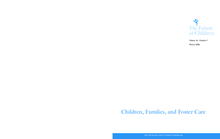Every year in the United States, over 250,000 children are removed from their homes due to abuse or neglect and placed in foster care. Often these children already have experienced multiple threats to their healthy development. These vulnerable children then enter a fragmented foster care system that lacks the necessary resources, technical proficiency, and interagency coordination to provide families with needed services and supports.
At any given time, over half a million children are in foster care. Many of these children are in state care for extended periods of time, bouncing from place to place. The instability of the foster care experience undermines efforts to promote the well-being of children while they are in care and to help children establish lasting bonds with caring adults. As a result, compared with other children, foster youth are much more likely to experience negative outcomes such as homelessness, involvement with the criminal justice system, and teen pregnancy.
New initiatives such as the Child and Family Services Reviews and the Adoption and Safe Families Act hold promise for improving the lives of children in foster care, but much more must be done to ensure their healthy development.
Better Monitoring of Child Well-Being. Children entering foster care are more likely to have physical and mental health problems and educational difficulties compared with other children. Yet, few states have the capacity to effectively assess the health and educational needs of children in foster care and monitor whether these needs are being meet. As a result, the health and educational needs of foster children are often ignored. One report found 34% of children in foster care had not received any immunizations, and only 10% had received services to address developmental delays.
Greater Efforts to Strengthen and Support Families. Strong and nurturing families are at the core of children’s healthy development, but few families receive what they need to play this critical role. For example, one study found that a lack of substance abuse- treatment programs and other services limited the ability of birth families to be reunified with their children. Other research has found that both foster parents and relative caregivers often do not receive the supports and services they need to nurture the children in their care.
Reforming the Child Welfare System. The child welfare system comprises numerous, overlapping agencies, each responsible for providing services to children and families, often with minimal coordination. Negotiating multiple agencies, each with their own requirements, can be overwhelming for families. However, models for better integration and coordination of services exist. For example, some states have colocated public assistance and child welfare agencies, and have brought substance-abuse-treatment specialists into child welfare agencies.
Foster children are the nation’s children, and we all bear a collective responsibility to ensure their healthy development while in state care. We can and should do more to return these children to wholeness, but it will require everyone who touches the lives of children in foster care—friends, families, communities, caseworkers, courts, and policymakers—to claim shared responsibility for the quality of those lives.

